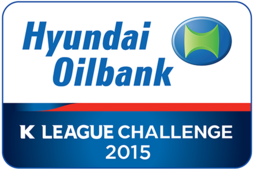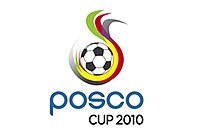
The 2002 FIFA World Cup, also branded as Korea Japan 2002, was the 17th FIFA World Cup, the quadrennial football world championship for men's national teams organized by FIFA. It was held from 31 May to 30 June 2002 at sites in South Korea and Japan, with its final match hosted by Japan at International Stadium in Yokohama.
The 2004 Korean League Cup, also known as the 2004 Samsung Hauzen Cup, was the 17th competition of the Korean League Cup.
The 1996 Korean League Cup, also known as the Adidas Cup 1996, was the sixth competition of the Korean League Cup.
The Adidas Korea Cup 1998 was the ninth competition of the Korean League Cup, and one of two Korean League Cups held in 1998.
The 2001 Korean League Cup, also known as the Adidas Cup 2001, was the 15th competition of the Korean League Cup.
The Philip Morris Korea Cup 1998 was the tenth competition of the Korean League Cup, and one of two Korean League Cups held in 1998.
The Daehan Fire Insurance Cup 1999 was the eleventh competition of the Korean League Cup, and one of two Korean League Cups held in 1999.
The 2009 K League Championship was the 13th competition of the K League Championship, and was held to decide the 27th champions of the K League. The top six clubs of the regular season qualified for the championship. The winners of the regular season directly qualified for the final, and second place team qualified for the semi-final. The other four clubs entered the first round, and the winners of the second round advanced to the semi-final. Each match was played as a single match, excluding the final which consisted of two matches. Jeonbuk Hyundai Motors became the champions for the first time by defeating Seongnam Ilhwa Chunma 3–1 on aggregate in the final.
The 2007 K League Championship was the eleventh competition of the K League Championship, and was held to decide the 25th champions of the K League. The top six clubs of the regular season qualified for the championship. The winners of the regular season directly qualified for the final, and second place team qualified for the semi-final. The other four clubs entered the first round, and the winners of the second round advanced to the semi-final. Each match was played as a single match, excluding the final which consisted of two matches.
The 1983 President's Cup Football Tournament was the 13th competition of Korea Cup. It was held from 4 to 17 June 1983, and was won by a Dutch club PSV Eindhoven for the first time, who defeated South Korea in the final.
The 2010 K League Championship was the 14th competition of the K League Championship, and was held to decide the 28th champions of the K League. The top six clubs of the regular season qualified for the championship. The winners of the regular season directly qualified for the final, and second place team qualified for the semi-final. The other four clubs entered the first round, and the winners of the second round advanced to the semi-final. Each match was played as a single match, excluding the final which consisted of two matches.

The 2011 Korean League Cup, also known as the Rush & Cash Cup 2011, was the 24th and the last competition of the Korean League Cup. It began on 16 March 2011, and ended on 13 July 2011.
The 2011 K League Championship was the 15th and the last competition of the K League Championship. It was held to decide the 29th champions of the K League. The top six clubs of the regular season qualified for the championship. The winners of the regular season directly qualified for the final, and second place team qualified for the semi-final. The other four clubs entered the first round, and the winners of the second round advanced to the semi-final. Each match was played as a single match, excluding the final which consisted of two matches.
The 2011 Korea National League was the ninth season of the Korea National League. The number of post-season playoffs' teams were increased to six and the playoffs were operated in the same format as the K League Championship. Before the start of the 2011 season, Yesan FC withdrew from the league due to its financial difficulty.
The 2008 K League Championship was the twelfth competition of the K League Championship, and was held to decide the 26th champions of the K League. The top six clubs of the regular season qualified for the championship. The winners of the regular season directly qualified for the final, and second place team qualified for the semi-final. The other four clubs entered the first round, and the winners of the second round advanced to the semi-final. Each match was played as a single match, excluding the final which consisted of two matches. Suwon Samsung Bluewings became the champions by defeating FC Seoul 3–2 on aggregate in the final.

The 2015 K League Challenge was the third season of the K League 2, the second-highest division in the South Korean football league system. Champions and winners of promotion playoffs could be promoted to the K League Classic.
The 2018 K League 2 was the sixth season of the K League 2, the second-highest division in the South Korean football league system.
The 2019 K League 1 was the 37th season of the top division of professional football in South Korea since its establishment in 1983, and the seventh season of the K League 1. Jeonbuk Hyundai Motors were the defending champions.
The 2019 K League 2 was the seventh season of the K League 2, the second-highest division in the South Korean football league system. Its champions could be promoted to the K League 1 the next season, and second, third and fourth-placed team advanced to the promotion playoffs.
The 2022 K League 2 was the tenth season of the K League 2, the second-tier South Korean professional football league. The champions and the winners of the promotion play-offs could be promoted to the K League 1.



